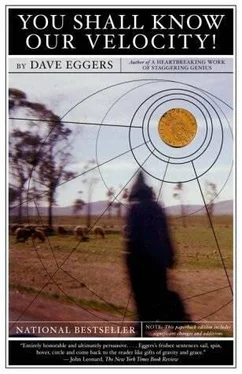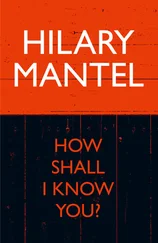Dave Eggers - You Shall Know Our Velocity
Здесь есть возможность читать онлайн «Dave Eggers - You Shall Know Our Velocity» весь текст электронной книги совершенно бесплатно (целиком полную версию без сокращений). В некоторых случаях можно слушать аудио, скачать через торрент в формате fb2 и присутствует краткое содержание. Жанр: Современная проза, на английском языке. Описание произведения, (предисловие) а так же отзывы посетителей доступны на портале библиотеки ЛибКат.
- Название:You Shall Know Our Velocity
- Автор:
- Жанр:
- Год:неизвестен
- ISBN:нет данных
- Рейтинг книги:5 / 5. Голосов: 1
-
Избранное:Добавить в избранное
- Отзывы:
-
Ваша оценка:
You Shall Know Our Velocity: краткое содержание, описание и аннотация
Предлагаем к чтению аннотацию, описание, краткое содержание или предисловие (зависит от того, что написал сам автор книги «You Shall Know Our Velocity»). Если вы не нашли необходимую информацию о книге — напишите в комментариях, мы постараемся отыскать её.
"You Shall Know Our Velocity! is the work of a wildly talented writer… Like Kerouac's book, Eggers's could inspire a generation as much as it documents it." – LA Weekly
"There's an echolet of James Joyce there and something of Saul Bellow's Chinatown bounce, but we're carried into the narrative by a fluidity of line that is Eggers's own." – Entertainment Weekly
"Eggers is a wonderful writer, bold and inventive, with the technique of a magic realist." – Salon
"An entertaining and profoundly original tale." – San Francisco Chronicle
"Eggers's writing really takes off – his forte is the messy, funny tirade, stuffed with convincing pain and wry observations." – Newsday
"Often rousing…achieves a kind of anguished, profane poetry." – Newsweek
"The bottom line that matters is this: Eggers has written a terrific novel, an entertaining and imaginative tale." – The Boston Globe
"There are some wonderful set-pieces here, and memorable phrases tossed on the ground like unwanted pennies from the guy who runs the mint." – The Washington Post Book World
"Powerful… Eggers's strengths as a writer are real: his funny pitch-perfect dialog; the way his prose delicately captures the bumblebee blundering of Will's thoughts;… and the stream-water clarity of his descriptions… There is genius here… Who is doing more, single-handedly and single-mindedly, for American writing?" – Time
***
Because of Dave Eggers' experiences with the industry when he released his first book, he decided to publish this novel on his own. It is only available online or at Independent Bookshops. If you enjoy this book, please buy a copy… this is one of the few cases where the author really will recieve his fair share of the proceeds, and you will be helping a fledgling publishing house. This e-copy was proofed carefully, italics left intact. There is no synopsis on the book, so here are excerpts from a Salon.com review:
Will Chmlielewski, the hero and narrator of "You Shall Know Our Velocity," is seeking relief for his head, which, on the inside, has been badly affected by the death of a friend and, on the outside, has been beaten to a pulp by a band of toughs. Will moves through the novel with a badly bruised and scabbed face, which everyone keeps telling him – and he keeps telling everyone – will heal to its former condition. It's the same hope Will holds out for his mind. He can't sleep without alcohol or masturbation.
The plot of "You Shall Know Our Velocity" is best recounted swiftly, since it hinges on motion and speed. Will has a friend called Hand. After Jack's death in a car crash, they agree to make a six-day trip around the world – "six, six and a half" – flying from country to country and dispersing $80,000 to strangers, money that Will has suddenly come into and which plagues him with white, Western guilt.
On their way to nowhere in particular, Will and Hand cross paths and lock horns with a variety of exotics – peasants, prostitutes, elegant Frenchwomen in dark cafes – none of whom seem to want Will's money. He literally can't give it away. In the cities, it causes pandemonium and never less than a quick escape. In the country, among African subsistence farmers, it throws Will into confusion – about money, charity, justice, his motives and such. Sometimes he calls his mother, which is no help. In Senegal, a statuesque Parisian named Annette joins Will and Hand for a midnight swim and tells them that they live in "the fourth world," something Will can't understand.
If it sounds a bit sophomoric, it is. So is "On the Road." So was "Emile." A certain crabbed critic for a paper of record has complained about Eggers' "shaggy-dog plot" and "self-indulgent yapping," but I think she's showing her age. A writer is among us, however imperfect, and he'll only get better if we leave him alone.












